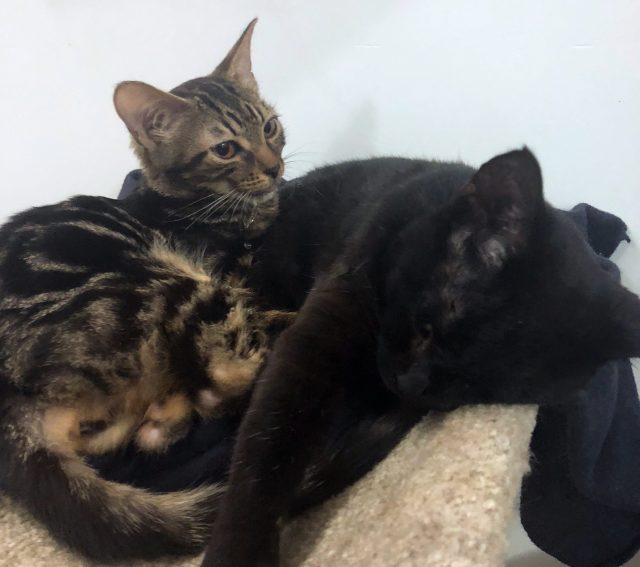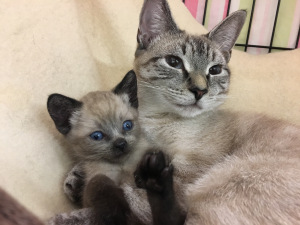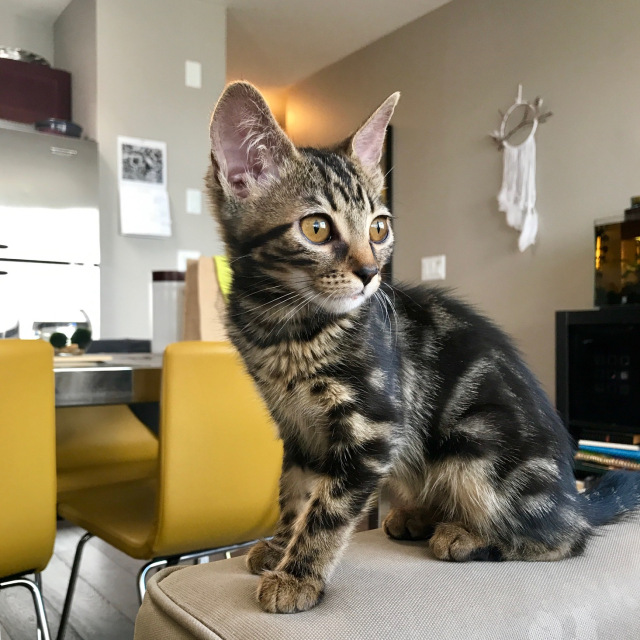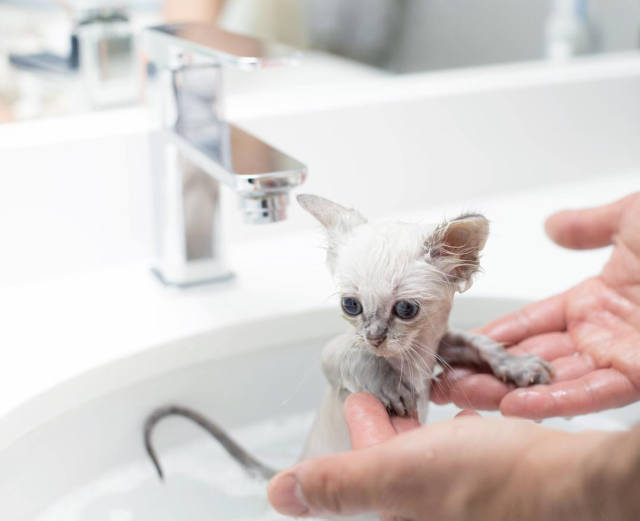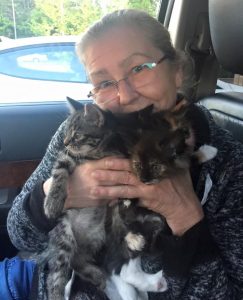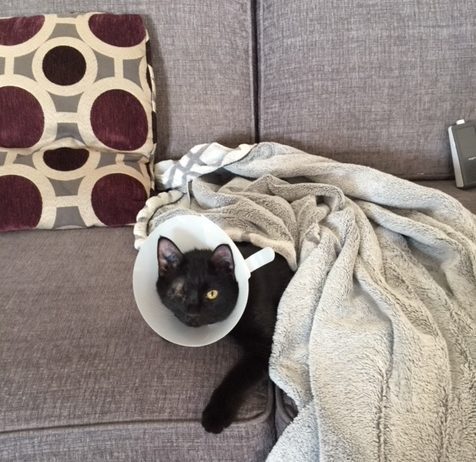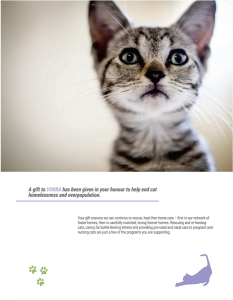 Spring has come and gone, but the memories remain…
Spring has come and gone, but the memories remain…
Little Spring, the kitten we’ve been telling you about, has very sadly passed away. Her short life, and her close friendship with bestie Hamburgler, were a heart warming inspiration to us all, say many VOKRA volunteers.
“The most amazing thing about Spring was that her spirit was super strong even though her body was so very frail,” says VOKRA volunteer Susan, who spent a good deal of time with this little kitten. “In her short life she taught us to focus on the positive, make the most of what we have and love unconditionally.”
Spring was born with an inoperable genetic defect, a portosystemic liver shunt, a disorder in which a cat’s blood supply bypasses the liver, leading to increased toxins in the blood. Most kittens with this condition die within weeks of birth, so Spring’s relatively long life (she was 5 months when she passed) is an amazing tribute to VOKRA’s good care.
At first, volunteers at VOKRA’s Operations Centre weren’t sure how long this tiny kitten would be around. At a few weeks of age, Spring wasn’t thriving. She crouched in her cage, too nauseous to nibble on her food or even nudge the hands of volunteers who reached in to pet her cute self.
After a vet visit or two, she seemed to recover and our volunteers made a momentous decision. Another adorable feline had just been rescued from life on Vancouver’s streets. This cat, named Hamburgler as he was found hiding under a McDonald’s dumpster, was paired with Spring.
At first, Spring was hesitant. Following some much-needed treatments, Hamburgler had become a happy rambunctious kittie, always wanting to play. He pounced on the little kitten, delighted to spot a new playmate.
But Spring soon learned to give as good as she got. On her healthy days, she and her new bestie chased each other around. On not so good days, Hamburgler began to help his friend, supporting her through her struggles.
Susan tells how he used to help make sure Spring was getting all the attentions she needed. “I was encouraging Spring to eat by getting her to lick food from my finger. It was a bit messy so when we were finished, Hammy rushed over and gave her face a good clean!”
Hamburgler even provided comfort on Spring’s worst days, when her health problems necessitated trips to the vet.
“When Spring travelled to the vet she would cry in the car,” says Susan. “But when Hammy started to accompany her in a shared carrier she was quiet and comforted. He even accompanied her on her last journey and groomed her beforehand to ensure she was respectable before they left!”
Hamburgler now has his own happy ending. He’s been adopted by VOKRA volunteer Leanne, who kindly waited to collect her new companion until Spring was no longer in need and then rushed in so Hamburgler would not have to spend a night alone in the pod he and Spring shared.
Leanne says Hamburgler is settling well into his new home, “He’s playing and giving me all the love and licks of affection.”
Spring’s fighting spirit, and her connection with Hamburgler, will linger in our minds for a long time.
In a final message about Spring, VOKRA co-founder Maria had this to say: “No matter what cards you are dealt, you can walk through life with kindness and love.”
Hamburgler says goodbye to Spring
]]>
Paul with Spitfire
October’s the month of Thanksgiving and we couldn’t be more thankful for all of our volunteers. Without the hundreds of individuals who give thousands of hours of their time each month, VOKRA, quite simply, wouldn’t exist. One of those volunteer is our Volunteer of the Month October – Paul Breland.
Paul began volunteering with VOKRA in the spring of 2013 and, since that time, he’s fostered 16 litters, including 15 moms and 67 kittens.
Paul started volunteering after being sent a link to a webcam run by a kitten foster for Purrfect Pals in Seattle. After watching him foster a mom and kittens for a while, Paul thought it looked like fun and there was no reason why he couldn’t do it.
“I had been going through my own kind of midlife crisis at the time, wondering what I was doing with my life besides working and playing PC games,” said Paul. “Helping kittens is a way to do something more meaningful with my spare time.”
 As a foster of moms plus their kittens, Paul’s main focus is ensuring the kittens grow up to be healthy, friendly and well-trained. If the kittens are around a week old when they arrive, it’s mostly a matter of making sure mom is well-fed and her litter scooped. As the kittens grow, Paul gets them used to being around people and being handled. He watches for any sign of ill health and weighs them frequently to ensure they’re going in the right direction. At around five weeks old Paul helps transition them to eating wet food and using the litterbox. As they near adoption age, he then submits pictures and bios for the website and answers questions when potential adopters come to view them.
As a foster of moms plus their kittens, Paul’s main focus is ensuring the kittens grow up to be healthy, friendly and well-trained. If the kittens are around a week old when they arrive, it’s mostly a matter of making sure mom is well-fed and her litter scooped. As the kittens grow, Paul gets them used to being around people and being handled. He watches for any sign of ill health and weighs them frequently to ensure they’re going in the right direction. At around five weeks old Paul helps transition them to eating wet food and using the litterbox. As they near adoption age, he then submits pictures and bios for the website and answers questions when potential adopters come to view them.
“Obviously, my favourite part of volunteering is getting to sit in a room surrounded by kittens!”, said Paul. “But aside from that, the best part is seeing how happy the adopters are when they pick up their new furry friends. Many have left in tears they’re so happy to be adding a new family member (or two or three).”
It’s hard for Paul to pick a favourite story out of so many, but when pressed he said fostering the “Shovel Kittens” is one of the best. “They were discovered on a cold, rainy November day when their mom was trying to shelter them under a shovel leaning against a house,” explains Paul. “When they came into my care, they were really hissy and didn’t like attention at all. But after weeks of socialisation and handling (and a bit of reverse psychology!), they discovered they loved attention and became purring lap kitties.”
It’s even more difficult to pick a favourite kitty out of the 82 he’s fostered so far, but Paul must go with Hurricane and Spitfire, two kittens he just adopted from his most recent litter as company for his 10-year-old girl kitty. Outside of family bias, one kitty who stands out is Dusty, adopted by a couple of Paul’s friends earlier this year. He’s a friendly little black floofball who became a little brother to another VOKRA kitty. He helped fill the void of a departed kitty and has become a huge part of their lives.
“Another one of my favourites is Elle, a dilute torbie who was over-the-top friendly and loved being held,” adds Paul. “She also went to a family who was having some tough times and immediately lifted everyone’s spirits.”
THANK YOU Paul for all the time, effort and love you put into ensuring all the moms and kittens in your care are set up for success! We can’t wait to hear more stories from the next 16 litters!
As a volunteer-driven non-profit, we clearly couldn’t do what we do without our extremely dedicated and hard working team of volunteers. Thank you to each and every one of you!
VOKRA’s always in need of volunteers and fosters. If you’re interested in volunteering with us visit our website at vokra.ca/volunteer or vokra.ca/fostering.
]]>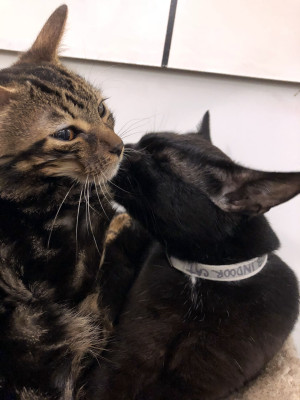 Fall?! Not at our Operations Centre. It’s still springtime at Ops! Spring, the kitten we first told you about last month, has had her ups and down, but the good news is she’s found a special friend.
Fall?! Not at our Operations Centre. It’s still springtime at Ops! Spring, the kitten we first told you about last month, has had her ups and down, but the good news is she’s found a special friend.
Little Spring is still getting her share of human attention, as our staff and volunteers continue to help her with her troublesome kidneys. But now Spring has some kitty love too! Her new ‘bestie’ and health helper is Hamburgler, an eight-year old cat rescued by VOKRA back in June of this year.
Like Spring, Hamburgler had a bit of a rough time before VOKRA came into his life. As one of Vancouver’s many stray cats, Hamburgler was often hungry and sick. When VOKRA volunteers found him, he was crouched under machinery in a shed behind a MacDonald’s restaurant, covered in fleas and with a serious infection in one eye.
Both Spring and Hamburgler ended up at our Ops Centre where they’re getting the care and love they need, and then someone had a bright idea. The health of both cats was stabilizing, but they seemed lonely. Why not room them together?
At first, Spring wasn’t sure what to make of her new stepbrother. But Hamburgler immediately started nudging her to play and soon brought her out of her shell. It wasn’t long before the pair were tossing toys around, touching noses and snuggling up together.
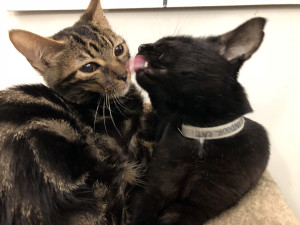 The sight of the happy twosome cuddled on a cat tree is one of the highlights of a shift at Ops for many a volunteer and staff member. The coming months may still bring some cold weather for these kitties. Spring is not entirely well and most recently she took another bad turn requiring yet another emergency trip to the vet. She will be returning for another vet visit soon for an ultrasound as we continue to diagnose her issues. And Hamburgler could have more problems due to his years on the streets. But for now they keep each other warm with the help of everyone at VOKRA and each other.
The sight of the happy twosome cuddled on a cat tree is one of the highlights of a shift at Ops for many a volunteer and staff member. The coming months may still bring some cold weather for these kitties. Spring is not entirely well and most recently she took another bad turn requiring yet another emergency trip to the vet. She will be returning for another vet visit soon for an ultrasound as we continue to diagnose her issues. And Hamburgler could have more problems due to his years on the streets. But for now they keep each other warm with the help of everyone at VOKRA and each other.
Spring and Hamburgler are just two of the thousands of reasons why we Walk for the Kitties.
Each year, VOKRA rescues more than 1,400 homeless cats and kittens from around the Lower Mainland. Unlike many other animal rescue groups, VOKRA is a volunteer-driven, no-kill organization. Our work is made possible through the generous support of volunteers, adopters and people like you.
Medical care accounts for more than 50% of our annual budget. Without your support we wouldn’t be able to afford to rescue all these cats and kittens.
Walk for the Kitties is our largest fundraising event of the year. This 5k fun walk takes place at Jericho Beach and all funds raised go directly towards supporting our rescue efforts. Learn more here.
Can’t make it on September 16? You can still donate today!
]]>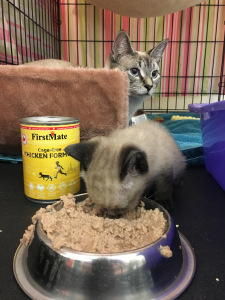
Little Nugget enjoying a snack
At VOKRA, we do our best to ensure all kitties who pass through our doors live the best lives they can. That’s why when we come across issues we always look for a pattern and try to find a solution.
Unfortunately, from time-to-time cats are returned to us due to behavioural issues, and the most common of these issues is peeing outside of the litter box. More times than not, the root cause is diet and stems from the fact the cat is fed primarily dry food.
Cats who eat mostly dry food also tend to have more urinary tract infections. And cats that are free fed, which is when food is left out for the cat to self-monitor their own diet, have it even worse as they’re often fat so they can’t clean themselves properly.
So, why is dry food the culprit?
Cats are designed by nature to be carnivores and their digestive tract, despite thousands of years of domestication, is not intended to assimilate dry food. Not only so, contrary to popular belief, dry food causes plaque to form on teeth. It’s also highly processed, making the body work anywhere from 12-18 hours to break it down. This means the cat is always half full and in a constant state of digestion. On the other hand, raw food moves through the body within four hours, while wet food takes 8-12 hours for the body to metabolize it.
Karen Duncan, co-founder of VOKRA, has fed a raw diet to all of her animals for more than 20 years and fully recommends a wet or raw diet for all kitties. At VOKRA, FirstMate is our first choice for the cats in our care and Karen explains why:
“We got involved with FirstMate a few years ago. They’re a local company, which beats buying masses of food shipped from the US. Every product is cruelty free as the protein is sourced ethically – all wild salmon and tuna, never farmed. There’s never any guar gum or thickeners. Instead, potatoes or peas are used. Their packaging is also epoxy free and the label is foil laminate, making everything recyclable. VOKRA’s very confident of the quality of FirstMate food and are able to get answers quickly from them if any arise.”
All of these reasons are why we feel so strongly about feeding cats a diet that primarily consists of wet or raw food.
So if your kitty is peeing outside of the box, has frequent urinary infections or stinky breath it will most likely be worthwhile for you to switch their diet away from dry. It will help save their health and will cost you less trips to the vet.
If you’d like to learn more about why wet is best click here.
]]>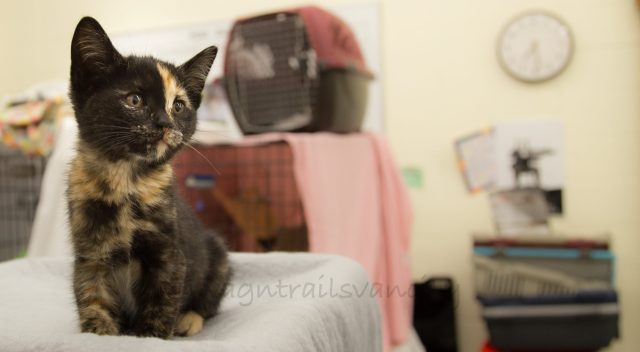 Kittens, kittens and more kittens.
Kittens, kittens and more kittens.
 Kitten season may be the cutest time of the year, but it means a lot of extra costs and work for us here at VOKRA. Each year during kitten season we care for more than 600 kittens, and this year’s no exception.
Kitten season may be the cutest time of the year, but it means a lot of extra costs and work for us here at VOKRA. Each year during kitten season we care for more than 600 kittens, and this year’s no exception.
As a volunteer-driven non-profit, we count on your support to be able to rescue so many kittens.
Kittens in our care have a chance at a happy, safe and healthy life. Kittens like these cuties who were found living at an industrial site out in Abbotsford. These little guys were lucky enough to be trapped by our dedicated volunteers and will now spend the rest of their lives in loving homes.
And, by taking these kittens off the streets and ensuring they’re spayed and neutered, we’re also breaking the cycle preventing more unwanted kittens from being born. It doesn’t take very long for five kittens to become 35, and for 35 kittens to become 105 and so on.
Kittens like these are just five of the thousands of reasons why we Walk for the Kitties.
Each year, VOKRA rescues more than 1,400 homeless cats and kittens from around the Lower Mainland. Our work is made possible through the generous support of volunteers, adopters and people like you.
Walk for the Kitties is our largest fundraising event of the year. This 5k fun walk takes place at Jericho Beach on September 16 and all funds raised go directly towards supporting our rescue efforts. Learn more here.
Without your support we wouldn’t be able to afford to rescue all these cats and kittens.
Please help this September 16 by joining us for Walk for the Kitties, presented by FirstMate.
Can’t make it on September 16? You can still donate today!
]]>
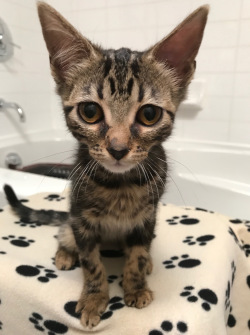 Forget fall; it’s springtime all over again at our Operations Centre. Spring the kitten, that is. This little feline has been getting her fair share of attention here at Ops, with playtime and cuddles galore.
Forget fall; it’s springtime all over again at our Operations Centre. Spring the kitten, that is. This little feline has been getting her fair share of attention here at Ops, with playtime and cuddles galore.
Sweet Spring’s mom was one of the many cats in Vancouver who aren’t spayed or neutered, leading to a lot of unwanted kittens for her owner. VOKRA staff and volunteers helped to spay Spring’s mom, and they’re now working hard to get Spring and her brothers and sisters ready for forever homes.
With her big amber eyes and attractive Bengal-like brown and yellow markings, Spring’s sure to be a hit when it comes time for her to be adopted. But there’s a problem. Spring’s the runt of the litter and she’s been having organ troubles. Her kidneys in particular show some congenital difficulties. Not so long ago, Spring was really nauseated and couldn’t pee or eat. Everyone at Ops spent a lot of time helping with her treatments and giving her some much-needed love.
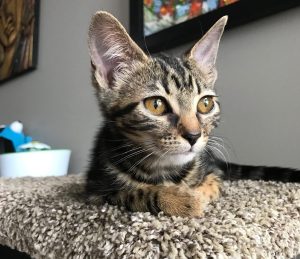 Right now Spring’s back to her regular self. She loves to chase plastic ball toys around her kennel and afterwards scratch her small nails on her cardboard ramp or snuggle up to her many admirers.
Right now Spring’s back to her regular self. She loves to chase plastic ball toys around her kennel and afterwards scratch her small nails on her cardboard ramp or snuggle up to her many admirers.
As a no-kill rescue, our volunteers strive to give a fighting change to every cat, including kittens like Spring, whose health problems could have led to her euthanization at other centres. Everyone at Ops is hoping for a long and happy life for little Spring, with a loving friend to take care of her. There may be some colder weather ahead for this tiny kitten as she may still need some special care. But we’re all in her corner and won’t let her down.
Kittens like Spring are just one of the thousands of reasons why we Walk for the Kitties.
Each year, VOKRA rescues more than 1,400 homeless cats and kittens from around the Lower Mainland. Unlike many other animal rescue groups, VOKRA is a volunteer-driven, no-kill organization. Our work is made possible through the generous support of volunteers, adopters and people like you.
Without your support we wouldn’t be able to afford to rescue all these cats and kittens.
Walk for the Kitties is our largest fundraising event of the year. This 5k fun walk takes place at Jericho Beach and all funds raised go directly towards supporting our rescue efforts. Learn more here.
Can’t make it on September 16? You can still donate today!
]]>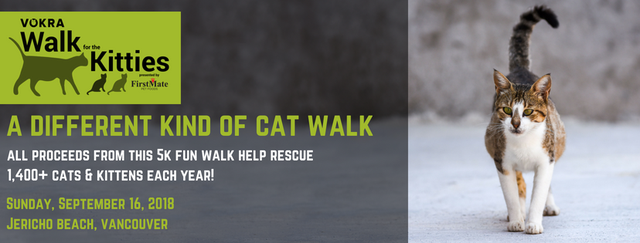
Oshi’s a tiny kitten with a big heart.
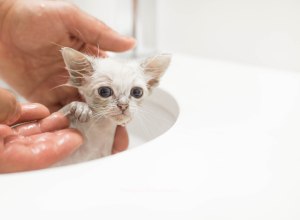 He was born the smallest of his litter and was discovered living outside with his siblings. They were all very thin when they were rescued so the first task was to try and fatten them up. All the kittens quickly transitioned to eating out of bowls, but not Oshi.
He was born the smallest of his litter and was discovered living outside with his siblings. They were all very thin when they were rescued so the first task was to try and fatten them up. All the kittens quickly transitioned to eating out of bowls, but not Oshi.
Oshi’s development has been much slower than his brothers and sisters. At 10 weeks old, he’s half the size of his brother TJ and until recently he refused to eat on his own. Oshi also has trouble pooping so his foster parents need to keep a close eye on him and sometimes help him out. (This includes giving him a bath on a regular basis!)
If Oshi hadn’t been rescued it’s almost certain he wouldn’t have survived on his own. Kittens like Oshi are just one of the thousands of reasons why we Walk for the Kitties.
Each year, VOKRA rescues more than 1,400 homeless cats and kittens from around the Lower Mainland. Unlike many other animal rescue groups, VOKRA is a volunteer-driven, no-kill organization. Our work is made possible through the generous support of volunteers, adopters and people like you.
Without your support we wouldn’t be able to afford to rescue all these cats and kittens.
Walk for the Kitties is our largest fundraising event of the year. This 5k fun walk takes place at Jericho Beach and all funds raised go directly towards supporting our rescue efforts. Learn more here.
Can’t make it on September 16? You can still donate today!
Want more Oshi? You can follow him on Instagram at @DailyDoseOfOshi.
]]>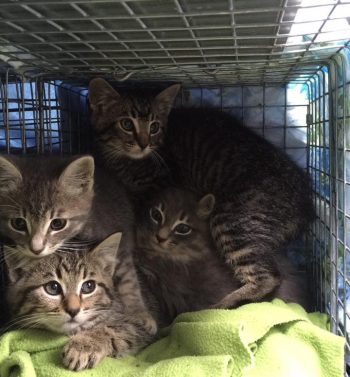 At VOKRA our mission is to end cat overpopulation and homelessness. One of the ways we’re helping accomplish this is through to Trap-Neuter-Return (TNR), the process of trapping feral cats, spaying or neutering them, and then returning them to the location they came from. We’ve seen a lot of success with TNR, but much of our time is actually spent on trapping tame strays. Trapping these cats and kittens is the first step towards finding them their furever homes.
At VOKRA our mission is to end cat overpopulation and homelessness. One of the ways we’re helping accomplish this is through to Trap-Neuter-Return (TNR), the process of trapping feral cats, spaying or neutering them, and then returning them to the location they came from. We’ve seen a lot of success with TNR, but much of our time is actually spent on trapping tame strays. Trapping these cats and kittens is the first step towards finding them their furever homes.
When we receive information about a stray cat, we find out as much information as we can to help us determine the best way to trap. We take into account how long the cat(s) has been hanging around and their lingering behaviour – are they coming at a specific time or are they around all the time? It’s important to know if they’re being fed or eating as well. Getting to know as much about the cats as possible is key to making a quick and successful trap. Behaviours such as skittishness or curiosity help us determine the correct method.
At times, it’s as easy as coaxing the cat into a carrier. Other times, setting up a trap is the only way. Traps are usually set up where the cat is being fed and include fresh tuna at the back of the trap. With feral cats, they’re taken to the vet for sedation and spay/neuter, vaccinations, ear and dental cleaning and flea treatment. They recover at our Operations Centre and are then taken back to their original location. The individual who called about the cat will be provided with food and any follow-up care. With tame cats, after they’re trapped they’re taken to our Operations Centre where we check for a microchip or tattoo. We deflea, deworm and vaccinate these kitties and have blood tests, urinalysis and teeth cleaning completed if they’re more than five years old. These tame cats are then ready for a foster home and, when they’re ready, will go up for adoption.
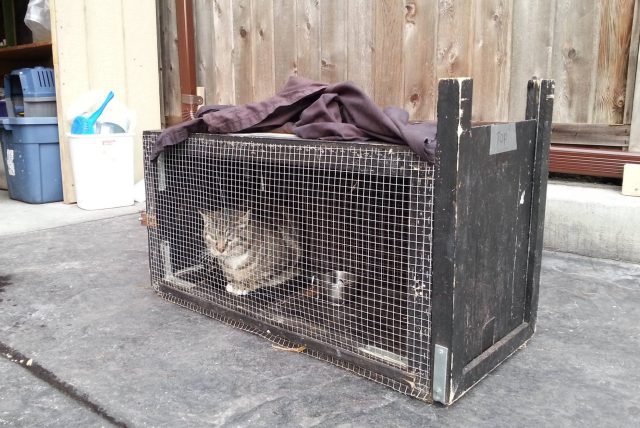
This is “Woody”, trapper Janet Cox‘s trusty wooden trap. She uses it to trap kitties who refuse to go into a metal trap. It always works like a charm!
It may seem feral cats could be more problematic than tame strays, but it’s just as important to trap these tame cats. Owned cats get lost and abandoned, which is a painful situation. If they aren’t fixed, they breed and female cats will usually give birth to their kittens outside or under garages, or amongst junk in a yard. These kittens will then grow up unsocialized by humans and grow into feral cats. If these kittens are also not spay/neutered, the cycle repeats itself and soon a feral colony will be formed. This is why it’s important for cat owners to spay and neuter their cats by five months old, and for the public to call us if they suspect a tame or feral stray who hasn’t been fixed is lingering around their neighbourhood.
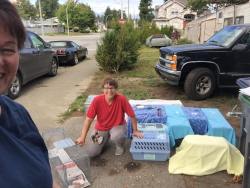
Dedicated Surrey volunteers and trappers, Anne Salomon and Mona Boucher know all the tricks to trapping.
Sometimes, our trappings don’t go as planned, as explained here by VOKRA co-founder and trapper extraordinaire Maria Soroski:
“I was called out to an industrial area in Burnaby because the business said they heard meowing coming from under the floorboards of the trailer on their property,” said Maria. “Since I couldn’t remove the floorboards, I crawled under the trailer to where they pinpointed they heard the kittens. When I found the area above me between the floorboards, I heard the noise – they were baby raccoons! I got out of there as soon as possible before the mama raccoon got mad.”
After trapping for 17 years and counting, Maria’s has countless stories. Here’s one of her most memorable ones (for cats, not racoons!):
“At least twelve years ago, I went to a location in East Vancouver where there were three adult feral cats, two female and one male, and a litter of five kittens that were eight weeks old,” explains Maria. “It was January, bitter cold that night with snow that had fallen on the ground. I set traps by the back lane garage for the kittens first and waited in my car to keep warm. Two kittens went in the traps immediately and as I was carrying the two traps to my car, I was suddenly surrounded by the adult cats. They were hissing so I ran as fast as I could to my car with the kittens in the traps while they chased me. I waited in my car again until the remaining kittens went into the traps. The three adult cats were waiting by my car, so I quickly opened the door and ran to the last traps. As I was bending down to pick up the traps, the two adult females jumped onto my back, growling and swatting. I managed to get them off me and got all the traps to my car. The adults were jumping up at my window, so I threw an open can of cat food onto the grass, started the car and drove off as they ran behind my car.”
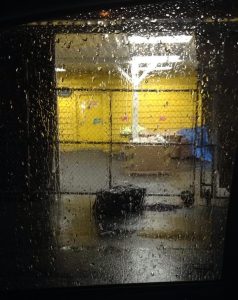
5:30 a.m. – Maria’s view as she waits patiently for some kittens, who were dumped in a back alley. to decide to go into the trap.
“I’ve never had this happen to me again, but I felt so bad for the cats as they saw their babies be driven away,” continues Maria. “The next night, I went and set traps for all three of the adult cats and took them to the vet for spaying and neutering. They stayed a couple days with us to recover and I let them see the kittens. It seemed to calm them down, knowing I didn’t cook their babies for dinner. The feral adults were returned to their original location and taken care of outside by the person who called us.”
Trapping isn’t an easy job, as we can all now see. It requires dedication and commitment to VOKRA’s mission. The trapping of tame strays is especially important as they have socialized with humans before, making them adoptable into a furever home. However, furever homes can’t exist if we don’t have pet-friendly housing. Global BC covers the issue here, making it clear our housing issues are a big cause for the loss of homes and families for too many pets. Sign the Pets OK BC petition here to help make a difference. Our trapping efforts are rendered useless if these kitties have less and less places to go once they’re ready for adoption.
Thank you to all our volunteer trappers who spend hours and hours watching over traps – be it sunshine or rain, day or night. Due to your efforts thousands of kitties have been taken off the streets and now have homes to call their own!
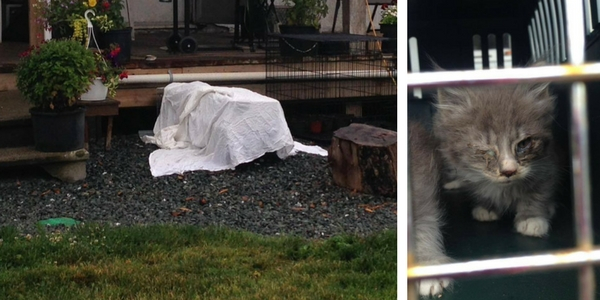
A mama and four kittens were trapped from under this porch. All the kittens had eye infections, but it was their lucky day. They were transferred to our Operations Centre for assessment and then onto foster care where they received daily treatment. Today mom and kittens are all healthy and have been adopted into loving homes.
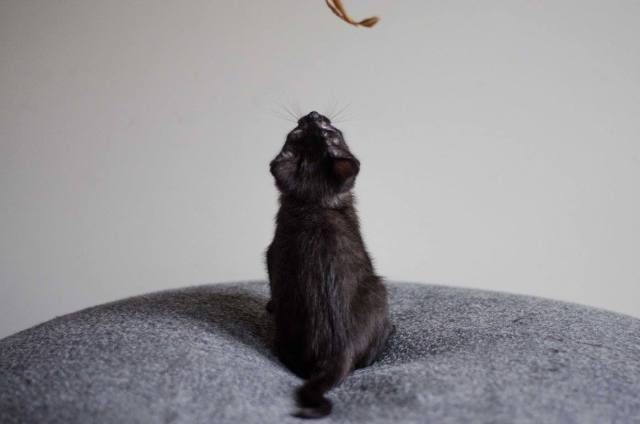
Every day the dedicated volunteers of VOKRA go to great lengths to save the lives of homeless cats and kittens from around the Lower Mainland. Little Hazel is one such kitten who may not be here today were it not for our care.
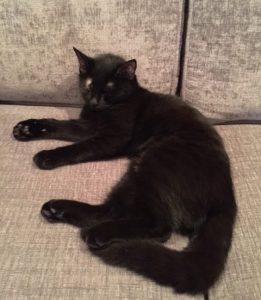 Hazel was born to a semi-feral mom who had recently been brought in to our Operations Centre. Not only was she the smallest kitten in the litter, she was born with one eye swollen shut. It turned out poor Hazel was born with an eye infection, resulting in ongoing issues with pain and poor vision in her eye.
Hazel was born to a semi-feral mom who had recently been brought in to our Operations Centre. Not only was she the smallest kitten in the litter, she was born with one eye swollen shut. It turned out poor Hazel was born with an eye infection, resulting in ongoing issues with pain and poor vision in her eye.
Hazel didn’t let her vision limitations slow her down though. She played, tumbled and chased her siblings around just like any other kitten. During one particularly active play session, Hazel’s weak eye was damaged and she was rushed to an emergency vet. It was discovered her weak eye was acting as a foreign body and had no chance of recovery, so it would eventually need to be removed.
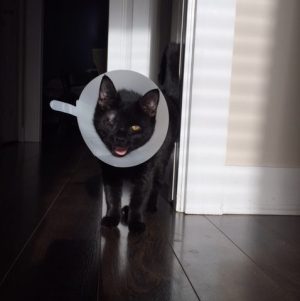 As the months passed by, all Hazel’s brothers and sisters were adopted while Hazel struggled with recurring infections, leading to her eye being removed at four months old. Unfortunately, her health problems continued and she returned for a second surgery.
As the months passed by, all Hazel’s brothers and sisters were adopted while Hazel struggled with recurring infections, leading to her eye being removed at four months old. Unfortunately, her health problems continued and she returned for a second surgery.
After two surgeries, two dewormings, four rounds of antibiotics and many more vet trips, Hazel continues to be a loving, intelligent, playful and overall adorable little ball of fluff. She’s so resilient that even two months of living with a cone around her head hasn’t slowed her down.
Happily Hazel will be available for adoption in the coming weeks. She’s a spirited little trooper who will be make some lucky family very happy. If you have room in your heart and home for little Hazel, keep an eye out for her on our ready-to-adopt page.
And if you’d like to help us pay for Hazel’s medical treatment, as well as the veterinary cost for all the other special kitties in our care, you can donate today at givetovokra.ca.
]]>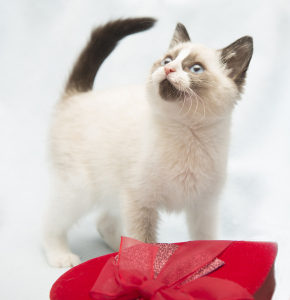 Christmas, Valentine’s Day, birthdays, anniversary. These are just a few of the days in the year when we look to find the perfect gift.
Christmas, Valentine’s Day, birthdays, anniversary. These are just a few of the days in the year when we look to find the perfect gift.
At first blush, giving a pet as a present might seem like an incredibly special and thoughtful gift, whether that be a kitten or a puppy, or a smaller pet like a hamster or a mouse. This is especially true if you know the person you’re shopping for loves animals and would possibly welcome receiving a pet as a gift.
However, giving a pet as a present, even if the person you intend to give it to has stated they’d like one is never a good idea.
People’s personal situations
If one of your friends or loved ones is always saying “Oh, I’d love a cat!” it might seem obvious that presenting them with the object of their desires is a great move to make. However, you should consider why this person who would “love a cat” does not already have one; there are undoubtedly many reasons you might not have any idea about. Perhaps they’re not allowed to have pets in their accommodation or work long hours and have made the responsible decision that pet ownership is not appropriate for them at this time.
They may have allergies or sensitivities that negate their ability to live with the pet they’d choose, they might be financially unable to care for a pet or their personal situation might be in flux and they’re not able to plan ahead sufficiently to consider pet ownership.
“I’d love to own a pet!” doesn’t indicate a meaningful desire to do so.
The choice of pet is personal
Choosing the right pet is a very personal process and every person should select their own animal (or wait for the right animal to select them.) This goes deeper than simply narrowing down what type of animal – cat, dog, bird, gerbil – the person in question would pick and pertains to the choice of individual animal itself.
Even if the person you wish to buy for knows precisely what type of pet and even what breed, age and sex they want, every single animal is different and has its own personality and temperament. They don’t come off a production line in a uniform manner! The potential pet owner should always pick their own pet and find the animal that matches their needs and appeals to them on a personal level, something that can’t be performed for them by a well-meaning third party.
Timing is crucial
As well as all of the other considerations to bear in mind regarding pet ownership, even if someone is actively on the lookout for a new pet, precisely when the time is right for them to get their pet is a personal choice that no one else can make for them. At its most basic, this might simply involve ensuring they have everything they need to take care of their pet and have researched what is involved thoroughly, or that they don’t have any holidays planned soon or any big changes happening in their lives.
But getting a new pet such as a puppy or kitten can also mean the prospective owner might need to take some time off work or rearrange their schedule to accommodate for the immediate needs of their new pet. Only the person planning to take on the ownership of a pet will know exactly when the time is right for them, and even a much-desired new pet can soon become a burden if it’s pushed onto someone who isn’t ready.
Each person needs the freedom to take responsibility for their own choices
Taking on the responsibility of caring for another life is no minor undertaking and it’s up to each and every potential pet owner to make sure they’re ready for this challenge, both in terms of logistics, such as time and money, and emotionally as well.
Again, knowing when someone is ready and making the conscious decision to get a pet and be a responsible pet owner is a personal thing and it’s important every potential pet owner goes through the process of learning, planning and judging themselves to be ready for the challenge. If you present someone with an animal as a gift, they won’t have had the opportunity to do this and both pet and person will suffer as a result.
Pets are not presents and living animals don’t make good gifts. If you know your loved one is looking to adopt, consider purchasing one of our adoption gift certificates by clicking here.
Another great alternative is to give a donation in honour of your loved one. You can do this easily by visiting givetovokra.ca. Upon request, we’ll also send the honouree a special card letting them know about your gift.
This post has been adapted from the following article www.pets4homes.co.uk/pet-advice/why-you-should-never-give-pets-as-presents
]]>



